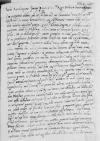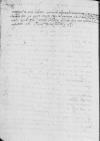Ita proximis diebus abs te factum est, mi suavissime Dantisce, ut nostro Spinulae, in cuius benevolentia atque observantia nemini cedo vel ipse non iniuria invidere possim. Quid? Ad eum longam et pluribus verbis scriptam dedisti ⌊⌋, ad me vero ne minimam quidem. Quod scelus (ita enim dicendum est) quam graviter tulerim, non est, cur ad te in praesentia scribendum putem, praesertim cum tibi exploratum esse non ignorem, quantum doloris secum afferat neglectus amor. Cuius impulsu hoc ad te litterarum me vel invitum dedisse scias, nam iratus (ingenue enim fatebor) in animum induxeram posthac ad te nullas dare litteras. Putabam pro nostra necessitudine meaque singulari singulari benevolentia perpetuaque observantia omnino fore, ne, quoties ⌊Genuam⌋ litteras mitteres, me tuas expectatissimas desiderare patereris, quas mihi ex omnibus iucundissimas fore non ignoras. Nam id litterarum tuarum genus et scribendi caracter est, ut vel ignotos ad te amandum facile attrahere possit. Sed quid illud? Videbar enim mihi litteris tuis legendis illa tua suavissima (ut cum hic aderas) consuetudine perfrui, cuius quidem memoria (ita dii me ament) sic oblector, ut nullus fere dies transeat, quin tua carmina summa cum voluptate legam. Nonne igitur iure mihi dolendum esse putas? Si me video ex litterarum tuarum desiderio ea voluptate carere, quam vix ullo tempore resarcire possim? Causaberis, quod vulgo ab omnibus usurpari solet, graviores curas, quibus te iugiter distineri non sum inscius. Accipio excusationem, hac tamen lege, ne posthac tuarum litterarum suavissimo fructu mihi interdici velis. Quod ni feceris, ipse facere non potero, quin te violatae amicitiae reum faciam, a quo quidem crimine boni omnes abhorrere debent. Hactenus tecum per iocum, mi suavissime Dantisce, agere libuit. Ceterum scias velim me usque adeo tibi addictum esse, ut hoc unum
 UUB, H. 154, f. 45v
praecipue in votis habeam, eam mihi aliquando occasionem a diis immortalibus dari, per quam meum erga te animum plane mihi demonstrare liceat superinscribed⌈demonstrare liceatdemonstrare liceat superinscribed⌉, cui me totum trado. Vale. Domino ⌊Cornelio⌋ salutem adscribo, qua meo nomine illum impartiri velis.
UUB, H. 154, f. 45v
praecipue in votis habeam, eam mihi aliquando occasionem a diis immortalibus dari, per quam meum erga te animum plane mihi demonstrare liceat superinscribed⌈demonstrare liceatdemonstrare liceat superinscribed⌉, cui me totum trado. Vale. Domino ⌊Cornelio⌋ salutem adscribo, qua meo nomine illum impartiri velis.
 UUB, H. 154, f. 45v
praecipue in votis habeam, eam mihi aliquando occasionem a diis immortalibus dari, per quam meum erga te animum plane mihi demonstrare liceat superinscribed⌈demonstrare liceatdemonstrare liceat superinscribed⌉, cui me totum trado. Vale. Domino
UUB, H. 154, f. 45v
praecipue in votis habeam, eam mihi aliquando occasionem a diis immortalibus dari, per quam meum erga te animum plane mihi demonstrare liceat superinscribed⌈demonstrare liceatdemonstrare liceat superinscribed⌉, cui me totum trado. Vale. Domino 

